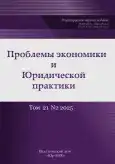From futures towards crypto derivatives: rethinking the derivatives' taxation methodology
- Authors: Borisov O.I.1
-
Affiliations:
- Financial University under the Government of the Russian Federation
- Issue: Vol 21, No 2 (2025)
- Pages: 277-283
- Section: Finance
- URL: https://journal-vniispk.ru/2541-8025/article/view/313250
- EDN: https://elibrary.ru/QOFFCX
- ID: 313250
Cite item
Abstract
The research subject is the taxation of derivative financial instruments in Russia and foreign countries. In recent years, the field of financial engineering has undergone fundamental changes. In addition to plain vanilla and structured derivatives, crypto derivatives are becoming increasingly widespread. Against the background of a paradigm shift in financial markets, the mechanism of taxation of derivatives in the Tax Code of the Russian Federation is in relative stagnation and does not change. Meanwhile, it is difficult to adapt new financial instruments to the traditional derivatives' taxation methodology that is based on the differences between delivery and settlement derivatives, and speculative and hedging transactions. The research purpose is to systematize the world practice of determining derivatives for taxation purposes and critically assess the feasibility of implementing elements of foreign methodological tools in Russia. The research methodology is a comparative analysis of approaches to the derivatives' taxation in Russia and foreign countries. The article groups the approaches to defining derivatives for tax purposes in world practice and highlights their features and shortcomings. It is established that in Russia the definition of derivatives is borrowed from civil legislation, although a more flexible approach is the one that provides for the allocation of abstract characteristics of derivatives for tax purposes. The author substantiates three abstract characteristic features of derivatives that distinguish them from other financial instruments and transactions. Based on them, a definition of derivatives for tax purposes is given as financial instruments, the value, and payments on which are in a deterministic dependence on the value of one or more stochastically changing basic variables of the underlying asset, which can be replicated and mirror-hedged during its term. The practical significance refers to the substantiating the need to expand the list of underlying assets and the exclusion of the limitation for derivatives without judicial protection from tax legislation.
Full Text
##article.viewOnOriginalSite##About the authors
Oleg I. Borisov
Financial University under the Government of the Russian Federation
Author for correspondence.
Email: oborisov@fa.ru
ORCID iD: 0000-0002-0350-1885
SPIN-code: 1678-6480
Cand. Sci. (Econ.), Associate Professor, Associate Professor of the Department of Taxes and Tax Administration, Faculty of Taxes, Audit and Business Analysis
Russian Federation, MoscowReferences
- Aksenova E. O., Yurasova I. O. Digital assets accounting and taxation in the Russian Federation // Economic development of Russia. 2025. Vol. 32, No. 1. P. 101–109.
- Apikova A. A. Derivative financial instruments in the taxation system of the Russian Federation: legal aspects // Original research. 2020. Vol. 10, No. 11. P. 90–98.
- Bezsmertnaya E. R. Place and role of derivatives in the evolution of the monetary system // Economy. Taxes. Law. 2020. Vol. 13, No. 5. P. 62–70.
- Goncharenko I. A., Mikhalenko E. I. Problems of legal regulation of taxation of income from hybrid financial instruments // Laws of Russia: experience, analysis, practice. 2019. No. 12. P. 95–101.
- Kochergin D. A., Pokrovskaya N. V. Interpretation of cryptoassets and features of their taxation in developed countries and Russia // Bulletin of Moscow University. Series 6: Economy. 2020. No. 5. P. 182–216.
- Lomshakov D. A., Filippov D. I. Derivative financial instruments on digital financial assets // Audit statements. 2023. No. 1. P. 98–103.
- Romanova A. M., Matyushenko S. I. Derivative financial instruments as a means of optimizing a securities portfolio // Economy and entrepreneurship. 2022. No. 1 (138). P. 688–695.
- Tkach Yu. B., Maksimov M. A. Features of taxation of derivatives in the commodity markets of the Russian Federation // Bulletin of the Institute of Friendship of the Peoples of the Caucasus (Theory of Economics and Management of the National Economy). Economic sciences. 2022. No. 3(63). P. 92–100.
- Tokarev E. A. Taxation of futures as a derivative financial instrument // Modern science: current problems of theory and practice. Series: Economics and law. 2020. No. 10. P. 195–197.
- Evolution of the derivative financial instruments market and the development of financial risk management mechanisms / E. R. Bezsmertnaya, I. A. Guseva, S. A. Panova [et al.]. Moscow: Prometheus Publishing House, Limited Liability Company, 2024. 288 p.
- Blum D. W. Derivative Finanzinstrumente im Ertragsteuerrecht. Schriften zum österreichischen Abgabenrecht. Band 74. Österreich: LexisNexis Verlag, 2014. ISBN 978-3-7007-5934-8.
- Deinwallner U. R. Derivative Taxation Change: Impact for Asset Hedging in Germany // Saudi Journal of Economics and Finance. 2021. Vol. 5, № 2. P. 62–71.
- Madsen C. E. J. Kryptowährungen im Steuerrecht. Forum Unternehmens-, Steuerund Bilanzrecht. Band 25. Deutschland: Peter Lang GmbH, 2023.
- Nguyen A. Q. The Mysteries of NFT Taxation and the Problem of Crypto Asset Tax Evasion // SMU Science and Technology Law Review. 2022. Vol. 25, № 2. P. 323.
- Romano C. Policy Forum: The Income Taxation of Crypto Contracts // Canadian Tax Journal. 2023. Vol. 71, № 1. P. 39–57.
- Vilas P. Ja. A study of derivatives market (with reference to futures and options) // Journal of Management Research and Analysis. 2023. Vol. 10, No. 1. P. 40–44.
- Wiedmann O. Taxation of Derivatives and Cryptoassets. Second edition. Series on International Taxation. Netherlands: Kluwer Law International B.V. 2024. P. 621.
Supplementary files








